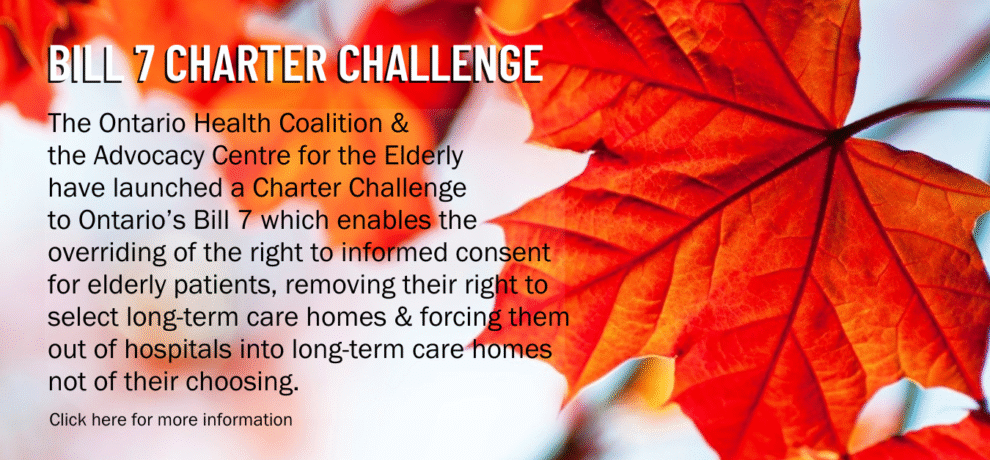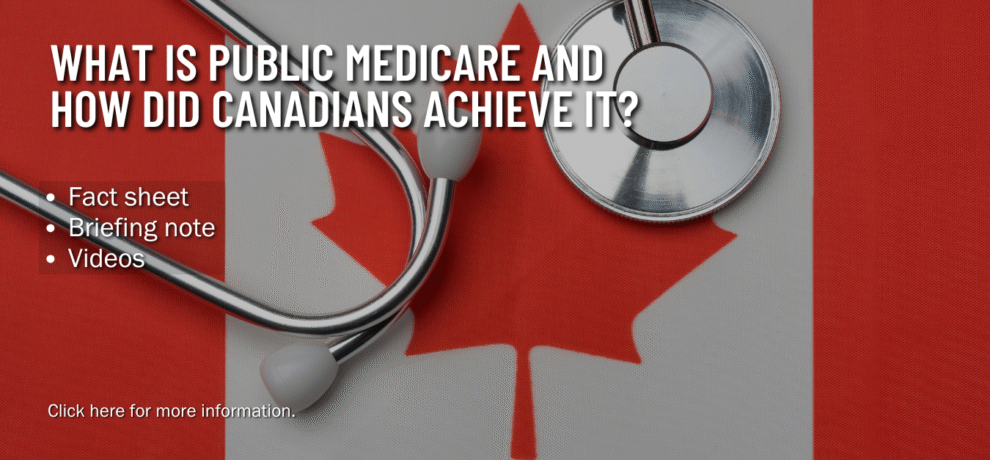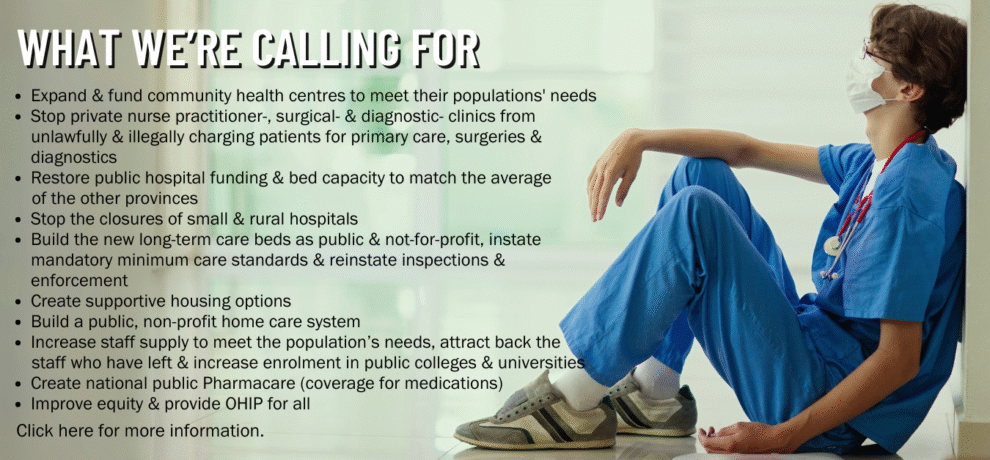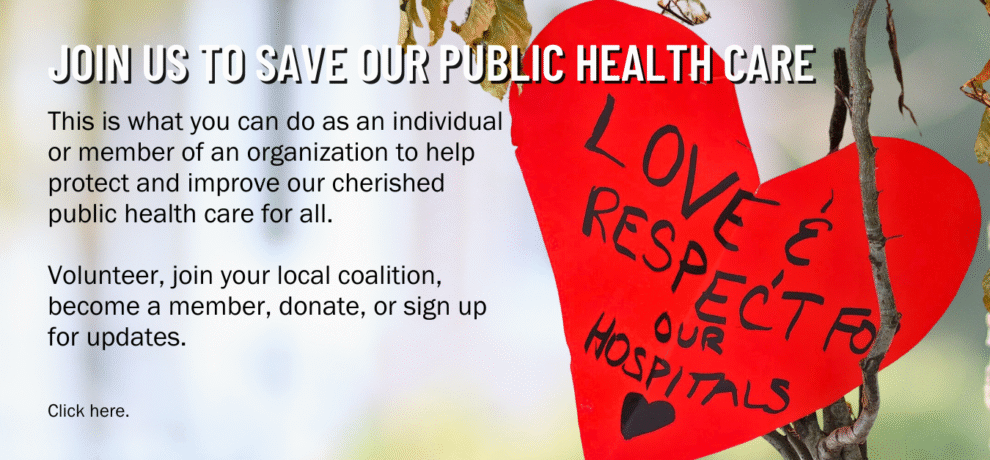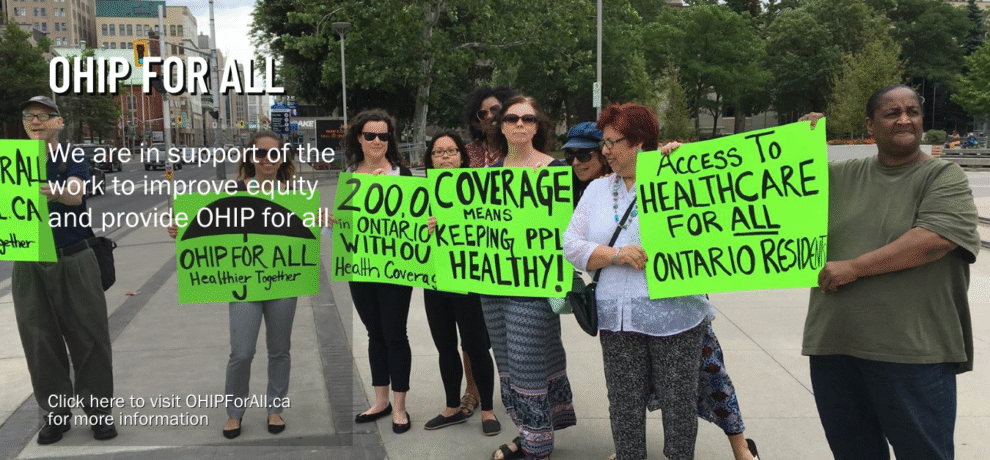Key Points to Think About
- The government’s plan to close hospital services and expand private clinics is not supported by the evidence. In fact, there is a significant body of academic research showing poor quality, safety concerns, higher user fees, cream- skimming of the most profitable and easiest cases at the expense of local hospitals, higher costs and a host of other problems associated with the fragmenting of community hospital services into private clinics.
- The plan to cut our local hospitals and contract out to private clinics will destabilize our local hospital budgets. Private clinics take the faster, easier patients from whom they can make the most money, leaving the complex, expensive and hard-to-serve patients behind for our local hospitals to take care of with less staff and fewer resources.
- This plan imperils rural hospitals – siphoning money away to highly specialized services that will be located in fewer sites across wider regions. Patients will have to travel further, and to more places, causing hardship, new costs for patients and difficulty accessing care.
- For-profit privatization is a very high risk and it could happen very quickly. In the model of private clinics proposed by this Liberal government, there is no legislated protection against for-profit privatization. In fact, this government plans to establish private clinics expressly not under the rubric of the Public Hospitals Act and therefore without the protections against privatization in the Public Hospitals Act. Even if the private clinics start out as non-profit, which has not been the case so far, the whole system of private clinics – as they are being proposed by this government – could be privatized with a stroke of a pen with almost no time for anyone to raise any opposition.
- There are already too few anesthesiologists, operating room nurses, radiologists, other specialists and health professionals in many areas of Ontario. High-volume, high-profit clinics will take scarce specialists and health professionals out of our local hospitals into private clinics where they will serve the healthiest and easiest population, leaving the hard and difficult cases for community hospitals with less staff to help.
- In the worst cases, private clinics have an interest in “upselling” and over-treating patients to make more money. Repeated studies over the last decade show that private clinics are more likely to conduct unnecessary tests and procedures in order to maximize their billings, and therefore increase their profits and income.
- Already the existing private clinics in Ontario have been plagued with serious safety and quality of care problems. In Ottawa, recently, the Ottawa Hospital cut thousands of endoscopies and privatized them to private clinics. In 2011, it was found that one of the private endoscopy clinics was not sterilizing its equipment properly. As a result 6,800 patients were warned that they had a risk of contracting HIV and hepatitis B & C. A study of private colonoscopy clinics showed that 13 per cent of the colonoscopies conducted in Ontario’s private clinics were incomplete (the scope didn’t make it all the way through the colon) leaving patients at higher risk for undetected cancers, and the standard of practice was well below that of public hospitals.
BRIEFING: Alberta is privatizing health care & it threatens public health care across Canada
(December 16, 2025) Alberta’s government, led by Danielle Smith and the United Conservative Party, passed a new law, Bill 11 The Health Statutes Amendment Act, last week. With its passage the existential threat for public medicare in Canada is here. The new law sets up two-tier medicare and private health insurance in Alberta. It is […]
Read MoreJOINT LETTER: Health Coalitions Demand Action: Alberta’s Bill 11 Threatens Public Health Care for All Canadians
(December 16, 2025) Dear Prime Minister the Right Honourable Mark Carney & Minister of Health the Honourable Marjorie Michel, Alberta’s Bill 11 The Health Statutes Amendment Act creates the legal framework for two-tier medicare. It establishes private health insurance and direct charges to patients for medically necessary health care. It will cause gross inequities in […]
Read More
(October 22, 2025)
As you know, the Ford government has been extremely tough to move, particularly given the political context. While Donald Trump is attacking Canada, people...
- Hope remains despite ‘existential threats’ to public health care, including Niagara’s: coalition
- Province holds pre-budget consultations in London
- ‘Outrage’ as St. Joe’s scraps NICU beds after hiring nurses
- Health group raises concerns about cancer care in Owen Sound
- For-profit company approved to extract plasma at double the rate of Canadian Blood Services
- Ontario is on track to lose thousands of nurses and hospital beds; Local MPP says situation a ‘disaster’ for Hamilton
- Lotteries have become key source of hospital funding in Ontario
- Toronto paid plasma clinics lure residents with ‘Super Hero’ loyalty program and cash bonuses
- Toronto paid plasma clinics lure residents with ‘Super Hero’ loyalty program and cash bonuses
- Some Torontonians are selling their blood plasma to make ends meet





